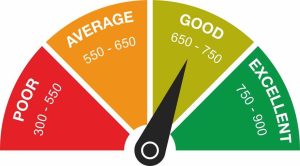Both your personal credit score and business credit score are considered when applying for a business loan. The credit score of the relevant fields reflects how creditworthy a borrower is.
In this article, we intend to help you understand what is required for you to improve your credit score to get a business loan.
Key takeaways
-
Why is a good credit score important?
-
How is a credit score calculated?
-
How to improve your credit score for a business loan?
-
How to get a business loan?
Why is a good credit score important?
In a nutshell it gives a brief but clear picture of how responsibly you use credit. A higher credit score means you have a history of wisely using credit.
How is a credit score calculated?

Your business’s credit score is calculated using several factors, such as:
- Your present and past credit relationships with lenders and vendors
- Your payment and repayment history on business loans, EMIs, lines of credit, and credit cards
- Bankruptcies (if any), legal filings, and decisions
How to improve your credit score for a business loan?
The following steps can be taken to improve your business credit score:
1. Never miss any payments on your credit card
This can be called the rule of thumb for any kind of credit, be it personal or a business loan. Make sure there is no default on both personal and business credit card bills and other payments.
When applying for a business loan, line of credit, or credit card, late payments have a negative influence on your credit score.
It is important to note that some lenders check your personal credit as well while sanctioning a business loan.
2. Keep your credit usage low
Your credit report lists liabilities such as credit card balances, term loans, and other credit lines. It’s a commonly acknowledged best practice to only use up to 30% of your credit limit.
The more you use credit, the more obvious your reliance on credit becomes.
In general, lenders won’t approve loans for companies with a lot of unpaid debt. Try to pay off older loans as quickly as you can to improve your business’s credit score.
3. Borrow from a mix of credit options
A mix of credit accounts for 10% of your credit score. This demonstrates your ability to handle the many commitments that come with borrowing different types of debt.
A consistent payment history across a variety of credit types helps lenders decide what loans or interest rates to provide you.
So, if you are building your business credit score, take both revolving credit and installment credit. To use revolving credit, you can apply for a business credit card, while for installment credit, you can opt for an SME loan or an unsecured business loan.
4. File GST and other taxes on a regular basis
While determining creditworthiness, lenders also keep track of borrowers’ sales and revenues.
Due to “information asymmetry,” lenders have historically been reluctant to lend to small businesses, which has made it difficult for them to obtain business loans.
Yet, timely GST registration makes every business transaction visible, making it simple for credit companies to obtain accurate data.
5. Limit the number of hard inquiries
When a prospective employer runs your credit or if any checks are made by financial organizations that you already do business with, it is called a hard inquiry. Hard queries that happen occasionally won’t have an impact on your credit score.
But a lot of queries within a short span of time will have an impact on your credit score. Lenders will see this as a sign that you need money because you are having trouble making ends meet.
6. Keep a track of your business’s credit report
You should routinely check your and your business’s credit report as a business owner. Watch out for any flaws or inaccuracies. Even a minor error in the credit report, such as a wrong mobile number, may have an impact on your company’s credit rating.
Make sure to notify the credit bureau right away if you find any errors or discrepancies on your credit report so that they can be corrected as soon as possible.
India has four major credit information companies, namely CIBIL, Experian, Equifax and Highmark. Along with the lending institutions, individuals can also assess their creditworthiness on any of these bureaus’ websites.
How to get a business loan?
One of the major reasons behind maintaining a good credit score is that it increases your chance of getting a business loan exponentially. Lenders minutely observe a business’s credit score to check your creditworthiness.
Although there is no hard and fast rule, a credit score (usually of CIBIL) of 650 and above is preferred by the lenders.
You can apply for a business loan with your bank or any RBI-approved NBFCs. In addition, there are multiple government schemes for SMEs that help with funds for your business.
You can also apply for a business loan without any collateral on UpScale. Apply now with your GST number, CIBIL Score and last 12 months’ bank statements.
For more details, visit our blog on the top questions asked about UpScale’s unsecured business loans from here.
